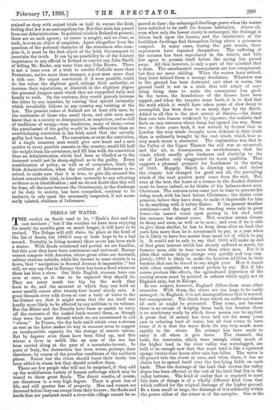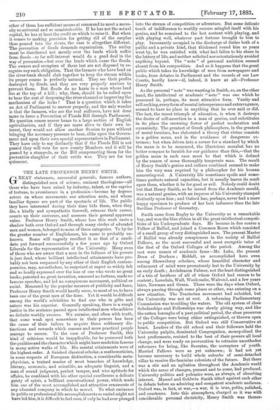PERILS OF WATER.
THE verdict on floods used to be, "Noah's first and the rest nowhere ;" but if the weather we have been enjoying for nearly six months goes on much longer, it will have to be revised. The Deluge will still claim its place at the head of the list of floods, but 1882-3 may at least hope to be a bad second. Probably in living memory there never has been such a winter. With floods occasional and partial we are familiar, but this year they have been continuous and universal. Europe cannot compete with America, where great cities are drowned, railway stations subside, while the torrent in some streets is so fierce, that "navigation in Second Avenue is impossible ;" but still, we may say that in Europe there has been a flood wherever there has been a river. Our little English streams have run over at once, as it was to be expected they should do. They are never much too big for the work they have to do, and the moment at which they can hold no more usually comes after twenty-four hours' steady rain. A great German river rolls down so vast a body of water to the far-distant sea, that it might seem that the sea itself was hardly more likely to be affected by any addition to its volume. But the Rhine and the Danube have been as unable to carry off the contents of the soaked lands around them, as though they were the mere threads which we are accustomed to call "rivers." In France, the dry beds amid which even a stream as vast as the Loire makes its way in summer seem to suggest an inexhaustible capacity for the storage of reserve waters. But by degrees even these have been filled up, and this winter a river in width like an arm of the sea has been carried along at the pace of a mountain-torrent. In parts of Italy, the destruction has been worse, perhaps, than elsewhere, by reason of the peculiar conditions of the northern places. Terror lest the rivers should burst their banks has been added to alarm lest they should overflow them.
There are few people who will not be surprised, if they add up the multifarious variety of human sufferings which may be traced to these great floods. The direct results, of course, are disastrous in a very high degree. There is great loss of life, and still greater loss of property. Men and women are drowned before they can escape from their houses ; the flocks and herds that are pastured round a river-side village cannot be re-
moved in time ; the submerged dwellings prove when the waters have subsided to be unfit for human habitation. Above all, even when only the lowest storey is submerged, the drainage is driven back upon the houses, and the inhabitants of the healthiest dwellings find themselves living above a poisonous cesspool. In many cases, during the past season, these experiences have repeated themselves. The suffering of the autumn has been reproduced in the winter, and bids fair again to present itself before the spring has passed away. All this, however, is only a part of the mischief that is done. The unexhausted consequences are less conspicuous, but they are more abiding. When the waters have retired, they leave behind them a strange desolation. Whatever was in the ground has been destroyed, and what is woese, the ground itself is not in a state that will admit of any- thing being done to make the consequent loss good. In the towns, the foundations of the houses have been sapped, and when the inmates come back, it is to find that the work which it would have taken years of slow decay to accomplish has been done in as many days by the floods. Added to all this is the slow misery of disease,—the damp that eats into frames weakened by exposure, the malaria that finds an easy entrance where damp has opened the way. Some two or three years back, it was noticed by doctors that in London the west winds brought more sickness in their train than is ordinarily brought by the east winds which bear so very much worse a character. The explanation was that in the Valley of the Upper Thames the soil was so saturated, and the air, in consequence, so unwholesome, that the winds which usually give freshness and elasticity to the air of London only exaggerated its worst qualities. That suggests a pleasant prospect for Londoners in the spring of 1883. Happily, March is drawing near, and unless the climate has changed for good and all, the prevailing winds of the next quarter must come from the east. Bat, even at the best, the heart of a farmer in the flooded districts must be heavy indeed, as he thinks of his balance-sheet next Christmas. The autumn rains came just in time to prevent his doing much with his land before Christmas ; the winter rains promise, before they have done, to make it impossible for him to do anything with it before Easter. If the present weather continues—and the signs of its mending seem only to grow fewer—he cannot count upon getting in his seed until the summer has almost come. Wet weather means disease to sheep and oxen, as well as to men ; and even if he is able to give them shelter, he has to keep them alive on food that costs him more than he is accustomed to pay, in a year when. he is likely to have less means than usual out of which to pay it. It would not be safe to say that 1883 will make an end of that great interest which has already suffered so much, for farmers seem able to bear more than other men. But it is plain that unless things change very quickly and very corn pletely, 1883 is likely to make the heaviest addition to their burdens that can be traced to any single year. How it stands with other countries, we cannot profess to say. But if like causes produce like effects, the agricultural depression of the coming season must be painted in colours which apply not to England only, but to Europe.
In one respect, however, England differs from some other countries. With them, the rivers are too large to be easily managed ; in England, it is not manageableness that is wanted, but management. The floods from which we suffer are almost all such as might be prevented. They come, not because there is no means of keeping them back, but because there is no machinery ready by which these means can be applied. A great deal of money has been laid out for many years, past in relieving land of water, but all that seems to have come of it is that the water finds its way very much more rapidly to the rivers. No attempt has been made to carry it off when it gets there. The channel, the locks, the reservoirs, which were enough when much of the higher land in the river valley was waterlogged, are held to be enough now that this same land is like a squeezed sponge twenty-four hours after rain has fallen. The water is all poured into the rivers at once, and when there, it has no choice but to spread itself over the low-lying fields on each bank. Thus the drainage of the land that crowns the valley slopes has been effected at the cost of the land that lies in the valley bottoms. The kind of outlay that is required to meet this state of things is of a wholly different kind from that which sufficed for the original drainage of the higher ground. Be a farm small or large, the drainage of it is orilinarily within the power either of the owner or of the occupier. One or the
other of them has sufficient means at command to meet a neces- sity so universal and so unmistakeable. If he has not the actual capital, he has at least the credit on which to raise it. But when it comes to making provision for getting rid of the surplus thus poured into the rivers, the case is altogether different. The prevention of floods demands organisation. The outlay must be distributed not merely over the lands which suffer from floods—so far self-interest would do a good deal in the way of persuasion—but over the lands which cause the floods. The owners and occupiers of these last are not disposed to re- cognise any such obligation. That the farmers who have land on the river-bank should club together to keep the stream within its proper course is perfectly natural. They see their profits destroyed by floods, and they are very properly anxious to prevent them. But floods do no harm to a man whose land lies at the top of a hill ; why, then, should he be called upon to bear the cost of deepening the river channel or improving the mechanism of the locks ? That is a question which it takes an Act of Parliament to answer properly, and the only wonder is that the farmers, who are the real sufferers, have not done more to force a Prevention of Floods Bill through Parliament. No question comes nearer home to a large section of English agriculturists, and if they are more alive to their own in- terest, they would not allow another Session to pass without bringing the necessary pressure to bear, alike upon the Govern- ment and upon their own special representatives in Parliament. They have only to say distinctly that if the Floods Bill is not passed they will vote for new county Members, and it will be passed by a stampede, as the Bill compensating them for the preventive slaughter of their cattle was. They are far too quiescent.















































 Previous page
Previous page